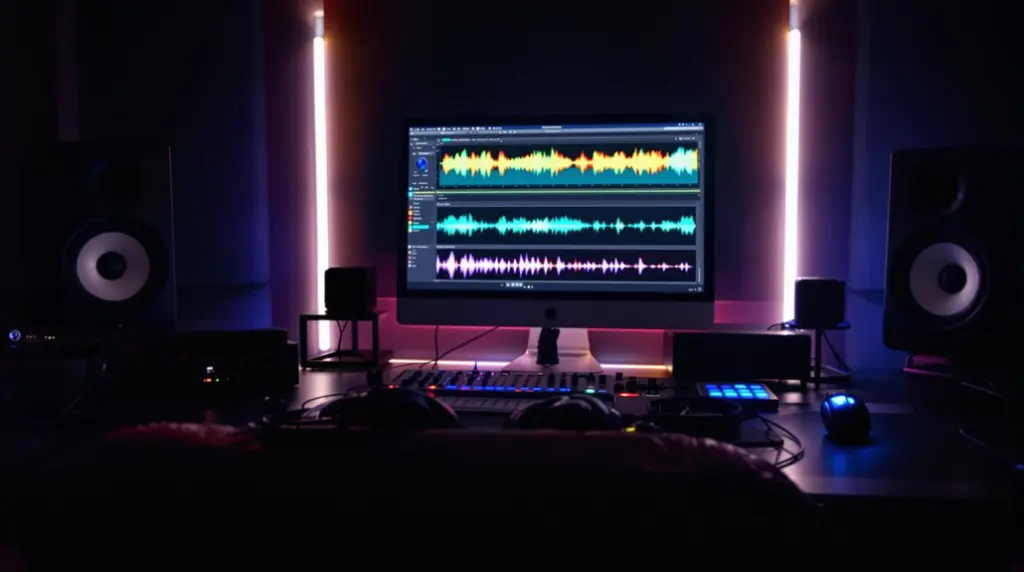AI is transforming your music production by harnessing intricate algorithms for mixing and mastering. These algorithms analyze your tracks, pinpointing specific frequencies to adjust for balance, consistency, and spatial enhancement. While AI mastering might initially disregard nuanced artistic interpretation, blending AI’s precision with your artistic insight guarantees both emotional and technical integrity. Additionally, AI mixing processes utilize algorithms trained on vast audio datasets to fine-tune various track components, aiming for superior enhancement. As AI learns from professional mixes and human feedback, its efficiency evolves. Such automation not only reduces technical errors but also guarantees consistent sound quality across your projects. Discover how these advancements open up new possibilities in music production.
Key Takeaways
- AI mastering tools automate audio enhancement, ensuring consistent sound quality across tracks.
- AI mixing algorithms learn from vast datasets, improving over time to match creator and listener preferences.
- Automation by AI in music production saves time and reduces technical errors, allowing for more creative focus.
- Adaptive AI algorithms offer customized mastering and mixing suggestions, streamlining the production process.
- The integration of AI in music production blurs the line between technical precision and artistic creativity, enhancing both efficiency and expression.
Understanding AI Mastering
To fully leverage the potential of AI Mastering in music production, it’s essential to understand how these advanced algorithms analyze and enhance audio tracks for a polished output. AI Mastering employs a complex set of artificial intelligence algorithms designed to scrutinize every detail of an audio track. These algorithms can identify specific frequencies that need adjustment, apply equalization (EQ) for balance, compression for consistency, stereo widening for spatial enhancement, and loudness maximization to meet industry standards.
However, while these tools offer the advantage of consistency and quick turnaround, they may not fully grasp the nuanced artistic interpretation intended by the original creators. The absence of the human touch in understanding the emotional depth and contextual subtleties of a piece means that AI Mastering might sometimes overlook the unique artistic choices that define a track’s identity. Hence, while utilizing AI Mastering, it’s important to recognize these limitations.
Balancing the technical precision of AI with a human’s interpretive insight makes sure that the final output not only sounds professionally polished but also retains the emotional and artistic integrity envisioned by its creators.
The AI Mixing Process
Delving into the realm of AI mixing, you’ll discover that this process leverages algorithms trained on vast audio datasets to analyze and adjust the distinct elements of audio tracks, thereby enhancing their overall sound quality. This cutting-edge AI integration into the mixing phase isn’t merely about applying preset adjustments; it’s an intricate process of separating and fine-tuning various components within the tracks. The ultimate goal? To achieve a superior audio enhancement that resonates with both the creator’s intention and the listener’s preference.
The heart of AI mixing lies in its capacity to learn from human input, hence evolving its performance and efficiency. This iterative learning, coupled with refinement techniques, is meticulously tailored to align with the producer’s unique preferences. It’s a process that synthesizes human creativity with machine precision, ensuring that each modification is both deliberate and nuanced.
Moreover, these AI mixing tools are adept at automating mundane tasks, significantly reducing the likelihood of technical errors. They provide a scaffold that guarantees consistent sound quality across tracks, a boon for producers aiming for a cohesive audio experience. Through this advanced AI integration, the audio enhancement process transcends traditional boundaries, setting a new standard in music production.
Benefits of AI in Production
While AI’s integration into music production heralds a new era of efficiency and creativity, it’s the automation of repetitive tasks that greatly enhances the workflow for producers and artists alike. AI innovation isn’t just about introducing new tools into the music scene; it’s fundamentally reshaping how music is produced, ensuring that production efficiency is at its peak. Here’s how:
- Automated Task Handling: AI notably improves efficiency by taking over tedious tasks such as balancing levels and EQ frequencies. This automation allows you to focus on the creative aspects of production.
- Consistent Sound Quality: Utilizing AI for mixing and mastering guarantees a consistent sound quality across different tracks. This level of consistency is challenging to achieve manually and is vital for maintaining professional production standards.
- Optimal Results through Learning: AI algorithms can analyze professionally mixed tracks and learn from them, offering you optimized mixing and mastering settings that lead to better production outcomes.
- Time and Effort Savings: By streamlining the mixing and mastering processes, AI technology in production not only saves time but also substantially reduces the effort required from musicians and producers.
These benefits underscore the transformative impact of AI on music production, making it an indispensable tool for modern producers and artists.
Top AI Tools Overview
Having understood the substantial benefits AI brings to music production, let’s explore some of the top AI tools that are redefining the processes of mixing and mastering. AI mastering tools like LANDR, MasteringBOX, and iZotope Master Assistant have revolutionized the way music is finalized, offering automated mastering solutions powered by adaptive AI algorithms. These platforms analyze audio tracks, providing instant mastering capabilities and customized mix suggestions to producers, greatly enhancing efficiency by automating tasks that traditionally took hours.
On the mixing front, tools such as Oeksound Soothe and Sonible Smart Compressor 2 are at the forefront, offering dynamic frequency processing and real-time audio analysis for precise mixing adjustments. These innovations in music technology not only reduce the time spent on technical aspects of music production but also guarantee consistent sound quality across tracks.
Future Trends in AI Music
The exploration of machine learning techniques in AI music tools is set to revolutionize how we interpret and engage with musical context, offering a fusion of technology and artistry that promises to redefine the landscape of music production. As you investigate further into the future trends in AI music, it becomes apparent that the convergence of AI music composition and creative automation isn’t just imminent; it’s here to reshape every facet of how music is created, mixed, and mastered.
- AI music composition is rapidly advancing to allow for more expressive and complex musical creations that challenge the traditional boundaries of genre and style.
- Creative automation is enabling a more intuitive and interactive workflow, where AI assists in refining ideas and executing technical tasks, freeing you to focus on the art.
- Hybrid mastering approaches are emerging, blending the precision of AI with the nuanced understanding of human engineers, offering the best of both worlds.
- Affordable and accessible AI mastering services are democratizing music production, allowing independent musicians to achieve professional-quality sound without prohibitive costs.
In essence, the future of music production lies in harnessing AI’s potential for creative collaboration, rather than viewing it as a replacement for human ingenuity.
Frequently Asked Questions
Can AI Mix and Master Music?
Yes, AI can mix and master music, leveraging algorithmic creativity for sound personalization. It analyzes tracks, making adjustments for a balanced sound, enhancing efficiency and consistency while needing human input for emotional depth.
How Is AI Being Used in Music Production?
AI’s transforming music production by automating tasks like mastering and composition. It analyzes and modifies sound design components, enhancing quality. You’ll find AI increasingly handling sound design and AI composition, streamlining the creative process efficiently.
How Artificial Intelligence Is Changing the Music Industry?
AI’s changing the music industry by generating lyrics and enabling virtual artist performances, streamlining creative processes. It’s shifting focus from manual tasks to innovation, reshaping how you create, distribute, and experience music.
Will Music Producers Be Replaced by Ai?
You’re unlikely to be replaced by AI in music production. Your creative intuition and understanding of human emotion add depth that AI can’t replicate, ensuring a balance between technological advances and essential human artistry.
Conclusion
To sum up, AI’s integration into music production, specifically in mixing and mastering, represents a paradigm shift. You’re witnessing a revolution where AI tools offer unprecedented precision and efficiency, streamlining workflows and democratizing high-quality production.
The benefits, from time-saving to creative augmentation, are clear. However, it’s crucial to stay informed about emerging trends and tools. As AI continues to evolve, staying at the forefront of these advancements guarantees you harness its full potential, keeping your productions cutting-edge and competitive.




